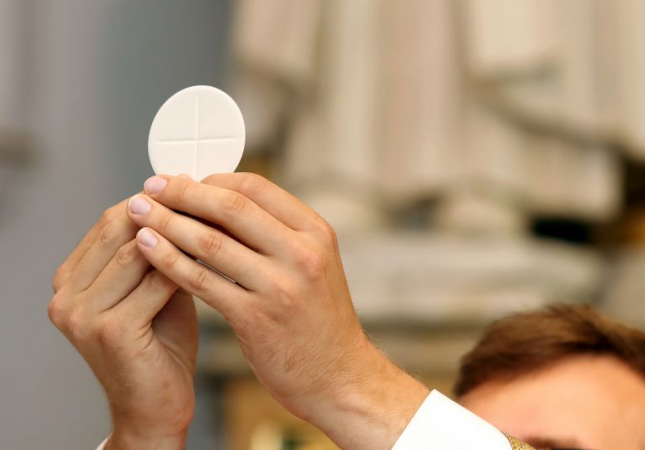
Although diocesan priority planning has not yet begun, Bishop Robert Gruss named two of his priorities for 2022 and beyond during a quarterly meeting with priests and parish leaders on Thursday, Dec. 16.
Plans for a movement of Eucharistic revival, “To renew the Church by enkindling a living relationship with the Lord Jesus in the Holy Eucharist,” are underway with direction from the United States Catholic Bishops.
Bishop Gruss’ hope is that this effort will bring about Eucharistic revival within the Diocese of Saginaw.
The vision set forth by the bishops is “A movement of Catholics across the United States, healed, converted, formed, and unified by an encounter with Jesus in the Eucharist – and sent out in mission ‘for the life of the world.’”
“I’m excited about this,” Bishop Gruss shared with priests and parish leaders. “In the early part of 2022, I’ll be looking to bring together a team to help me plan the next three years. The first phase, the diocesan phase, will begin on the Feast of Corpus Christi 2022. The parish phase will launch the following year and during year three we’ll be getting ready for a National Eucharistic Congress and Missionary Sending.”
Additional details will be shared as they become available.
Catholic Schools
In addition to Eucharistic revival, Bishop Gruss identified Catholic schools as a priority.
A group which includes a priest, deacons, principals, school board members, chancery staff and more has been meeting to develop and implement a strategic plan for Catholic schools.
During the presentation for priests and parish leaders, the group shared that they have been reaching out to other successful Catholic schools across the state and country for ideas and best practices relating to diocesan and local school governance, marketing, enrollment and financial viability. The group also shared a commitment to providing tangible assistance to school leaders, not just direction.
Catholic schools have been identified as the optimal setting for religious education and formation. Several key commitments have been made and include: ensuring schools are authentically Catholic; providing excellence in faith formation, academics, and extracurricular activities; making Catholic schools more accessible; enhancing collaboration between parishes, schools and families; and utilizing a funding model for both short- and long-term financial health.
With the support of Bishop Gruss, the group will make recommendations to strengthen Catholic schools across the diocese.
“I’m committed to our Catholic schools and grateful for the work being done,” Bishop Gruss said. “Our parishes and greater communities all benefit from the Christ-centered education our students receive. I look forward to doing all we can to best position our schools right now and into the future.”
Additional information is expected this spring.